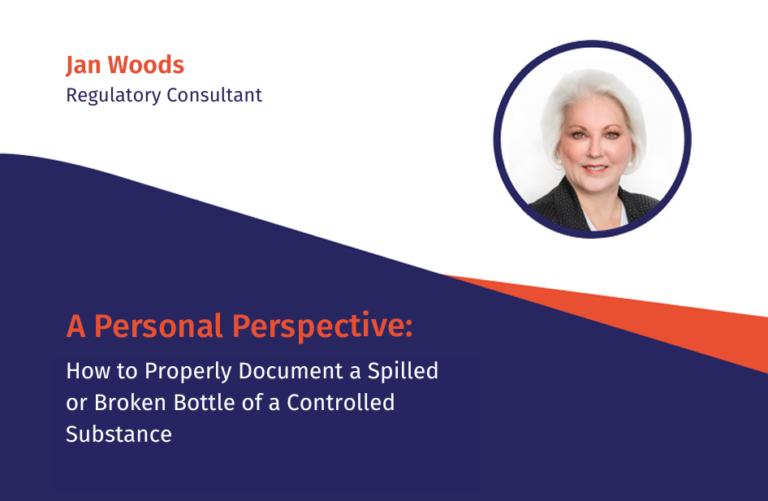The following blog is written by Epicur Pharma’s Advisory Council member Jan Woods, a veterinary hospital consultant, and national speaker with expertise in DEA compliance, state and federal regulations, and clinic and hospital practice management.
Below, Jan outlines how to properly manage a spilled or broken bottle.
Have you ever broken or spilled a bottle of a controlled substance? If so, did you document it? Correctly, according to the Drug Enforcement Administration (DEA) regulations?
Answering no to either of those documentation questions could mean your practice is at risk. The stocking of controlled substances in veterinary practices offers several benefits to patient care, but it also means veterinarians and staff must stay up to date on proper documentation, handling, storage, and disposal methods to ensure the practice remains compliant.
Mistakes happen – bottles spill or break. Keep these small messes from turning into larger ones by improving your compliance with DEA regulations!
5 Reminders for Properly Documenting a Spilled or Broken Bottle of a Controlled Substance
- A spill or breakage does not constitute a loss because the registrant can account for the controlled substance.
- A spill or break does not require notification to the DEA, per 70 FR 47096and 68 FR 40578. However, the DEA specifically states that the registrant “should continue to employ common sense, good faith approaches to their reporting, and recordkeeping obligations in the case of breakage and spillage.”
- The person who spilled or broke the bottle and a witness (2 people total) must immediately date and log the spill or break in your controlled substance reconciliation log, by schedule and list the reason for the break or spill. For example a bottle accidentally broke or spilled/unintentional loss.
- Dispose of the controlled substance spill or break according to controlled substance medical waste regulations.
- Fill out a DEA Form 41 completely, using the same reason for the break or spill as written in your controlled substance reconciliation log. For example, a bottle accidentally broke or spilled/unintentional loss. Keep the break or spill on file with your controlled substance recordkeeping. *Reminder* your state regulations may differ from the DEA’s
If you need any type of controlled substance guidance, logs, forms, pre or post-audit, or a controlled substance policy, you can find more at askjanforhelp.com.
Thanks for the insights, Jan! Want to hear more from Jan? Check out our previous blog from her about helping veterinary practices better understand the value of 503B manufacturers.
More to Read

Innovating Pain Management in Veterinary Research Medicine
Epicur Pharma recently partnered with two passionate veterinary research professionals, Dr. Daniel D. Myers Jr., DVM, MPH, DACLAM, and Dr. Patrick A. Lester, DVM, MS, BCPS, DACLAM, to bring a groundbreaking analgesic solution to market for research animals: Buprenorphine Extended Release. We sat down with them to reflect on their path to partnering with us and their hopes for the future of veterinary medicine.

Controlled Substances 101: How & Why You Must Comply! Parts 1 and 2
December 8 | 7 p.m. ET RACE-Approved CE Credit Hours: 2Free to attend Attendees will learn how to improve security, prevent theft per DEA regulations and proactively prepare for a DEA audit and best practice time saving suggestions from a previous veterinary practice owner, consultant & public speaker/educator, who has worked with Veterinarians cited by the DEA. Save My Seat

Introduction to Cancer Genomics and Precision Medicine for Dogs
April 14 | 8 p.m. ET RACE-Approved CE Credit Hours: 1Free to attend In this presentation, you will learn about cancer genomic testing for the veterinary patient and how tumor genetic biomarkers can guide and enhance diagnosis and treatment protocols. In addition, you will learn how genomics testing can offer better prognostic projections based on genetic mutations present in a particular tumor. Watch It Now


